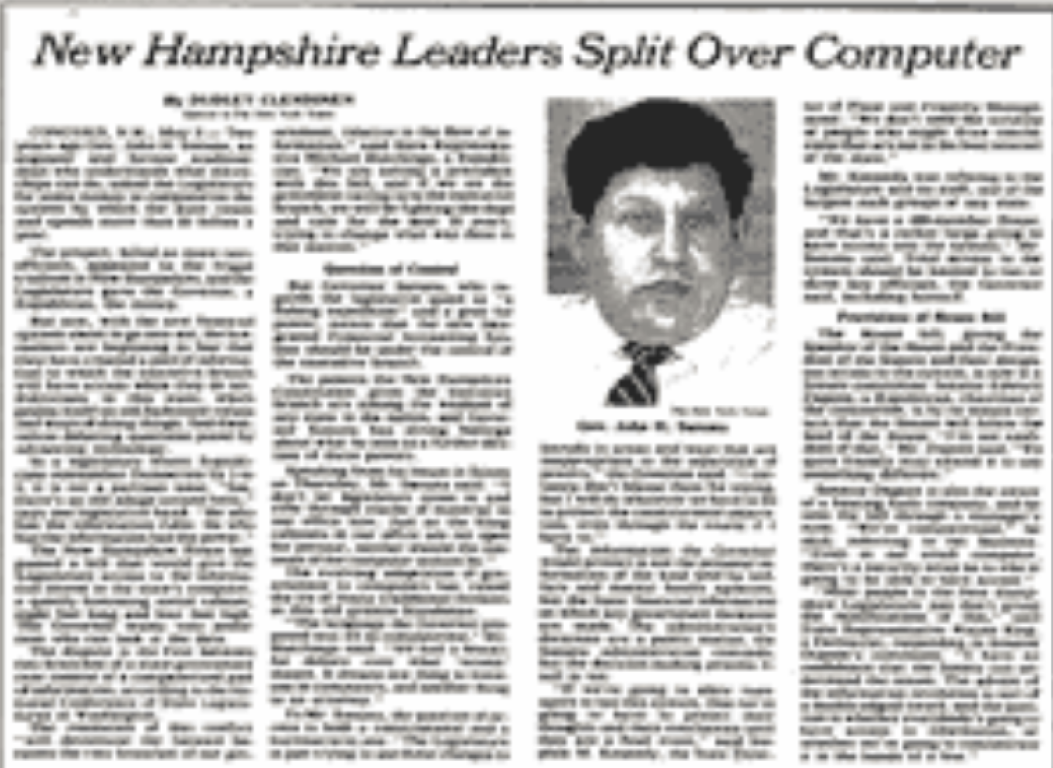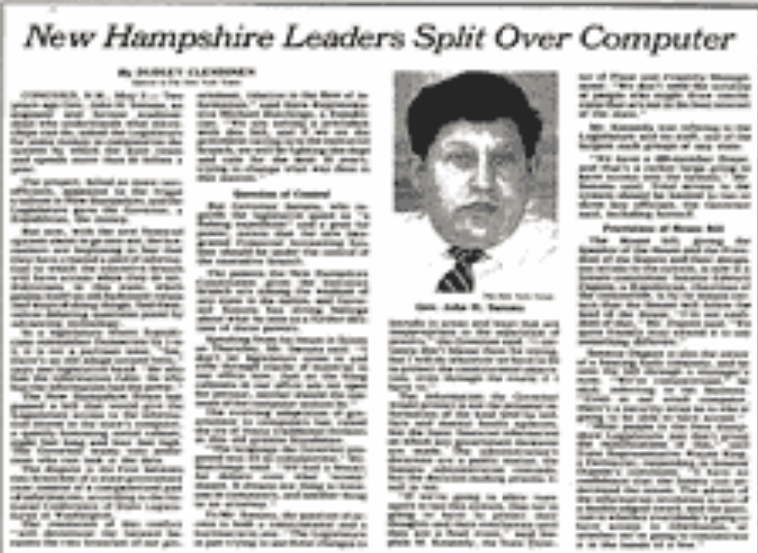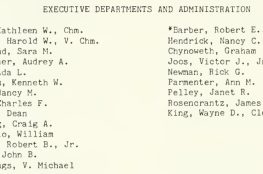May 6, 1985
Credit...The New York Times Archives
See the article in its original context from
May 6, 1985, Section A, Page 14

NYT Articel Screenshot 1985-05-06 – Copy
NEW HAMPSHIRE LEADERS SPLIT OVER COMPUTER
By Dudley Clendinen, Special To the New York Times
This is a digitized version of an article from The Times’s print archive, before the start of online publication in 1996. To preserve these articles as they originally appeared, The Times does not alter, edit or update them.
Occasionally the digitization process introduces transcription errors or other problems; we are continuing to work to improve these archived versions.
Two years ago, Gov. John H. Sununu, an engineer and former academic dean who understands what microchips can do, asked the Legislature for some money to computerize the system by which the state raises and spends more than $1 billion a year.
The project, billed as more cost-efficient, appealed to the frugal tradition in New Hampshire, and the Legislature gave the Governor, a Republican, the money.
But now, with the new financial system about to go into use, the lawmakers are beginning to fear that they have created a pool of information to which the executive branch will have access while they do not. Politicians in this state, which prides itself on old-fashioned values and ways of doing things, find themselves debating questions posed by advancing technology.
In a legislature where Republicans outnumber Democrats by 3 to 1, it is not a partisan issue. ''See, there's an old adage around here,'' says one legislative hand. ''He who has the information rules. He who has the information has the power.''
The New Hampshire House has passed a bill that would give the Legislature access to the information stored in the state's computer, a quietly humming metal cabinet, eight feet long and four feet high. The Governor wants veto power over who can look at the data.
The dispute is the first between two branches of a state government over control of a computerized pool of information, according to the National Conference of State Legislatures in Washington, The resolution of this conflict ''will determine the balance between the two branches of our government, relative to the flow of information,'' said State Representative Michael Hutchings, a Republican. ''We are setting a precedent with this bill, and if we set the precedent caving in to the executive branch, we will be fighting like dogs and cats for the next 10 years, trying to change what was done in this session.''
Question of Control
But Governor Sununu, who regards the legislative quest as ''a fishing expedition'' and a grab for power, insists that the new Integrated Financial Accounting System should be under the control of the executive branch.
The powers the New Hampshire Constitution gives the executive branch are among the weakest of any state in the nation, and Governor Sununu has strong feelings about what he sees as a further dilution of those powers.
Speaking from his house in Salem on Thursday, Mr. Sununu said: ''I don't let legislators come in and rifle through stacks of material in our office now. Just as the filing cabinets in our office are not open for perusal, neither should the contents of the computer system be.''
The evolving adaptation of government to computers has raised the ire of many traditional thinkers in this old granite Statehouse.
''The language the Governor proposed was all in computerese,'' Mr. Hutchings said. ''We had a beautiful debate over what 'access' meant. It means one thing to someone in computers, and another thing to an attorney.''
Balance of Power
To Mr. Sununu, the question of access is both a constitutional and a bureaucratic one. ''The Legislature is just trying to use these changes to intrude in areas and ways that are inappropriate to the separation of powers,'' the Governor said. ''I certainly don't blame them for trying, but I will do whatever we have to do to protect the constitutional separation, even through the courts if I have to.''
The information the Governor would protect is not the personal information of the kind held by welfare and mental health agencies, but the basic financial information on which key government decisions are made. The administration's decisions are a public matter, the Sununu administration contends, but the decision-making process itself is not.
''If we're going to allow managers to use this system, then we're going to have to protect their thoughts and their conclusions until they are a final event,'' said Stephen M. Kennedy, the State Director of Plant and Property Management. ''We don't need the scrutiny of people who might draw conclusions that are not in the best interest of the state.''
Mr. Kennedy was referring to the Legislature and its staff, one of the largest such groups of any state.
''We have a 400-member House, and that's a rather large group to have access into the system,'' Mr. Sununu said. Total access to the system should be limited to two or three key officials, the Governor said, including himself.
Provisions of House Bill
The House bill, giving the Speaker of the House and the President of the Senate and their designees access to the system, is now in a Senate committee. Senator Edward Dupont, a Republican, chairman of the committee, is by no means certain that the Senate will follow the lead of the House. ''I'm not confident of that,'' Mr. Dupont said. ''We quite frankly may amend it to say something different.''
Senator Dupont is also the owner of a heating fuels company, and he sees the bill through a manager's eyes. ''We're computerized,'' he said, referring to his business. ''Even in our small computer, there's a security setup as to who is going to be able to have access.''
''Most people in the New Hampshire Legislature just don't grasp the ramifications of this,'' said State Representative Wayne King, a Democrat, responding to Senator Dupont's comments. ''I have no confidence that the Senate can understand the issues. The advent of the information revolution is sort of a double-edged sword, and the question is whether everybody's going to have access to information, or whether we're going to concentrate it in the hands of a few.''



